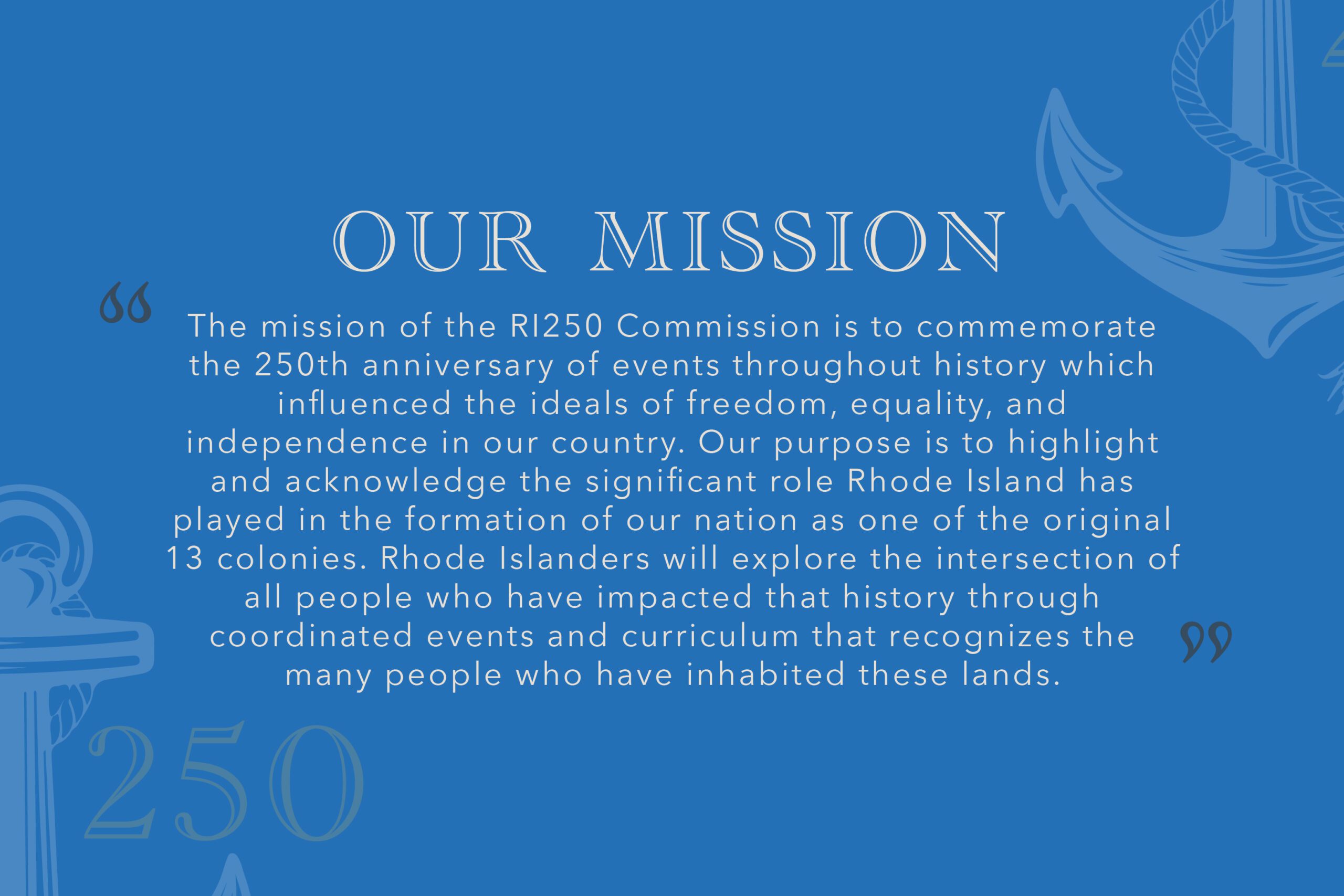Rhode Island History
2026 marks the 250th anniversary of our nation. The Rhode Island Semiquincentennial 250th Commission (RI 250th Commission), was established in 2021 through a joint resolution from the General Assembly. Rhode Island has a pivotal role in the founding of our country – the attack on the HMS Gaspee was the first act of aggression against the British. It is commemorated in Rhode Island, and across the nation, as the spark that ignited the American Revolution. This important anniversary presents an opportunity for Rhode Islanders, and all Americans, to reflect on the many significant events that inspired the birth of our country from a diversity of perspectives.


Innovation. Hope. Acceptance.
Rhode Island has always been a place where new ideas and ways of thinking can grow and thrive. Roger Williams, our colonial founder, established Rhode Island’s first town after being banished from Massachusetts Bay Colony for his “new and dangerous opinions.” That town, Providence, was built on Narragansett land thanks to Williams’ relationship with sachems Canonicus and Miantonomi. In the following years, other religious dissidents founded other towns in the area, and the colony began to take the shape we recognize today.
King Charles II granted the colony a royal charter in 1663. A landmark document for its time, the charter granted settlers in Rhode Island the right to govern themselves and guaranteed their right to freedom of religion without government interference. One hundred-nine years later, Rhode Island was the first colony to stage a major attack against England, burning the royal navy vessel HMS Gaspee to the waterline to protest taxation and trade infringement. In May of 1776, the colony was the first to renounce its allegiance to the king, declaring that “George the third, King of Britain, forgetting his dignity… and entirely departing from the duties and Character of a good king, instead of protecting is endeavoring to destroy the good people of this colony… by sending fleets and armies to America, to spread fire, sword and desolation throughout our country in order to compel us to submit to the debasing and detestable tyranny.”
Rhode Island also authorized the first non-white military regiment, the 1st Rhode Island Regiment. Comprised of men of African and Indigenous descent, it served in several battles including the Battle of Rhode Island in 1778, and the decisive Battle of Yorktown in 1781.
Shortly after the American Revolution, Rhode Island innovation was on view again in the new nation’s first successful factory, Samuel Slater’s textile mill in Pawtucket, Rhode Island. For the next 100 years, our state continued to lead the way in manufacturing, building mills and introducing new technologies. However, the immigrants who came to run these mills highlighted an inequity in the state: non-land holders were denied the right to vote. This led to the Dorr Rebellion of 1842, which sought to expand voting rights to non-landholders. Although the rebellion was quashed and Dorr sent to prison, it prompted the state to draft its first constitution which greatly expanded voting rights in the state.
These early moments in Rhode Island’s history show that our state has always had a unique way of doing things. Today, Rhode Island continues to be a leader in fields like renewable energy, with the nation’s first offshore wind farm near Block Island. And local festivals like PVDFest showcase our state’s world-renowned arts and music scene, while internationally recognized events like Newport’s Folk and Jazz Festivals bring people from around the world to Rhode Island. From historic sites to top-tier restaurants to pristine beaches, every corner of Rhode Island holds something special. We encourage Rhode Islanders and visitors alike to remember our founding ideals and enjoy the lively experiment that Rhode Island continues to be.
Virtual Classroom
Want to learn more about Rhode Island history? Explore these resources from our fantastic partners!






